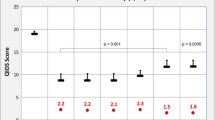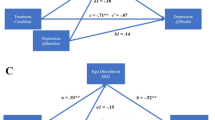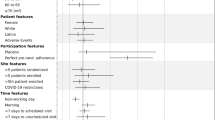Abstract
OBJECTIVE: A previous study described the effect of a collaborative care intervention on improving adherence to antidepressant medications and depressive and functional outcomes of patients with persistent depressive symptoms 8 weeks after the primary care physician initiated treatment. This paper examined the 28-month effect of this intervention on adherence, depressive symptoms, functioning, and health care costs.
DESIGN: Randomized trial of stepped collaborative care intervention versus usual care.
SETTING: HMO in Seattle, Wash.
PATIENTS: Patients with major depression were stratified into severe and moderate depression groups prior to randomization.
INTERVENTIONS: A multifaceted intervention targeting patient, physician, and process of care, using collaborative management by a psychiatrist and a primary care physician.
MEASURES AND MAIN RESULTS: The collaborative care intervention was associated with continued improvement in depressive symptoms at 28 months in patients in the moderate-severity group (F1,87=8.65; P=.004), but not in patients in the high-severity group (F1,51=0.02; P=.88) Improvements in the intervention group in antidepressant adherence were found to occur for the first 6 months (χ2(1)=8.23; P<.01) and second 6-month period (χ2(1)=5.98; P<.05) after randomization in the high-severity group and for 6 months after randomization in the moderate-severity group(χ2(1)=6.10; P<.05). There were no significant differences in total ambulatory costs between intervention and control patients over the 28-month period (F1,180=0.77; P=.40).
CONCLUSIONS: A collaborative care intervention was associated with sustained improvement in depressive outcomes without additional health care costs in approximately two thirds of primary care patients with persistent depressive symptoms.
Similar content being viewed by others
References
Katon W, Von Korff M, Lin E, et al. Collaborative management to achieve treatment guidelines: impact on depression in primary care. JAMA. 1995;273:1026–31.
Katon W, Robinson P, Von Korff M, et al. A multifaceted intervention to improve treatment of depression in primary care. Arch Gen Psychiatry. 1996;53:924–32.
Simon G, Von Korff M, Heiligenstein J, et al. Fluoxetine versus tricyclic antidepressants: a randomized trial of effectiveness and cost in primary care. JAMA. 1996;275:1897–905.
Wells K, Sherbourne C, Schoenbaum M, et al. Impact of dissemination quality improvement programs for depression in managed primary care: a randomized controlled trial. JAMA. 2000;283:212–20.
Hunkeler E, Meresman J, Hargreaves W, et al. Efficacy of nurse telehealth care and peer support in augmenting treatment of depression in primary care. Arch Fam Med. 2000;9:700–8.
Simon G, Von Korff M, Rutter C, Wagner E. Randomized trial of monitoring, feedback and management of care by telephone to improve treatment of depression in primary care. BMJ. 2000;320:550–4.
Katon W, Von Korff M, Lin E, et al. Stepped collaborative care for primary care patients with persistent symptoms of depression: a randomized trail. Arch Gen Psychiatry. 1999;56:1109–15.
Lin E, Von Korff M, Russo J, et al. Can depression treatment in primary care reduce disability? A stepped care approach. Arch Fam Med. 2000;9:1052–58.
Katon W, Lin E, Von Korff M, et al. The predictors of persistence of depression in primary care. J Affect Disord. 1994;31:81–90.
Derogatis L, Rickzels K, Uhlenhuth E, Covi L. The Hopkins Symptom Checklist: a measure of primary symptom dimensions. In: Pichot P, ed. Psychological Measurements in Psychopharmacology: Problems in Psychopharmacology. Basel: S. Karger AG; 1974:79–112.
Walker E, Katon W, Russo J, et al. Predictors of outcome in a primary care depression trial. J Gen Intern Med. 2000;15:859–67.
Williams JB, Gibbon M, First MB, et al. The Structured Clinical Interview for DSM III-R (SCID): multi-site test-retest reliability. Arch Gen Psychiatry. 1992;49:630–6.
Mayfield D, McLeod G, Hall P. The CAGE Questionnaire: validation of a new alcohol screening instrument. Am J Psychiatry. 1974;131:1121–3.
Katon W, Rutter C, Ludman E, et al. A randomized trial of relapse prevention of depression in primary care. Arch Gen Psychiatry. 2001;58:241–7.
HEDIS. 1999 New Measure National Results: HEDIS users group monthly update. Washington DC: National Committee for Quality Assurance; 1999.
Katon W, Ludman E, Simon G, et al. The Depression Help Book. Boulder, Colo: Bull Publishing Company; 2002.
Katon W, Ludman E, Simon G, et al. Depression (recurrent and chronic): Self-Care Companion for Better Living. [videotape] New York: Time-Life Medical Patient Educational Media Inc.; 1996.
Simon G, Revicki D, Von Korff M. Telephone assessment of depression severity. J Psychiatr Res. 1993;27:247–52.
Costa P, McCrae R. The NEO Personality Inventory Manual. Odessa, Fla: Psychological Assessment Resources; 1985.
Sheehan DV, Harnett-Sheehan K, Raj B. The measurement of disability. Int Clin Psychopharmacol. 1996;11(Suppl 3):89–95.
Sullivan M, Katon W, Russo J, Dobie R, Sakai C. A randomized trial of nortriptyline for severe chronic tinnitus: effects on depression, disability, and tinnitus symptoms. Arch Intern Med. 1993;153:2251–9.
Agency for Health Care Policy and Research. Depression in Primary Care. Treatment of Major Depression. Vol. 2. Rockville, Md: U.S. Department of Health and Human Services; 1993. (Publication AHCPR 93-0511).
Katzelnick D, Kobak K, Jefferson J, Greist J, Henk H. Prescribing patterns of antidepressant medications for depression in an HMO. Formulary. 1996;31:374–88.
Clark D, Von Korff M, Saunders K, Baluch W, Simon G. A chronic disease score with empirically derived weights. Med Care. 1995;33:783–95.
Weiner JP, Starfield BH, Steinwachs DM, Mumford LM. Development and application of a population-oriented measure of ambulatory care case-mix. Med Care. 1991;29:452–72.
Hedeker D, Gibbons R. MIXREG: a computer program for mixed effects regression analysis with autocorrelated errors. Comput Methods Programs Biomed. 1996;49:229–52.
Hedeker D, Gibbons R. MIXOR: a computer program for mixed effects ordinal regression analysis. Comput Methods Programs Biomed. 1996;49:157–76.
Sturm R, Unützer J, Katon W. Effectiveness research and implications for study design: sample size and statistical power. Gen Hosp Psychiatry. 1999;21:274–83.
Diehr P, Yanez D, Ash A, Hornbrook M, Lin D. Methods for analyzing health care utilization and cots. Annu Rev Public Health. 1999;20:125–44.
Lin E, Simon G, Katon W, et al. Can enhanced acute-phase treatment of depression improve long-term outcomes. A report of randomized trials in primary care. Am J Psychiatry. 1999;156:643–5.
Katzelnick D, Simon G, Pearson S, et al. Randomized trial of a depression management program in high utilizers of medical care. Arch Fam Med. 2000;9:345–51.
Unützer J, Rubenstein L, Katon W, et al. Two-year effects of quality improvement on medication management for depression. Arch Gen Psychiatry. 2001;58:935–42.
Lin E, Katon W, Von Korff M, et al. Relapse of depression in primary care. Rate and clinical predictors. Arch Fam Med. 1998;7:443–9.
Simon G. Long-term prognosis of depression in primary care. Bull World Health Organ. 2000;78:439–44.
Katon W, Von Korff M, Lin E, Simon G. Rethinking practitioner roles in chronic illness: the specialist, primary care physician and practice nurse. Gen Hosp Psychiatry. 2001;23:138–44.
Author information
Authors and Affiliations
Corresponding author
Additional information
This work was supported by grants #MH-4-1739 and #MH 016473 from the National Institute of Mental Health Services Division in Bethesda, Md (Dr. Katon).
Rights and permissions
About this article
Cite this article
Katon, W., Russo, J., Von Korff, M. et al. Long-term effects of a collaborative care intervention in persistently depressed primary care patients. J GEN INTERN MED 17, 741–748 (2002). https://doi.org/10.1046/j.1525-1497.2002.11051.x
Issue Date:
DOI: https://doi.org/10.1046/j.1525-1497.2002.11051.x




